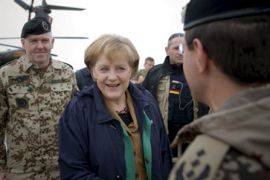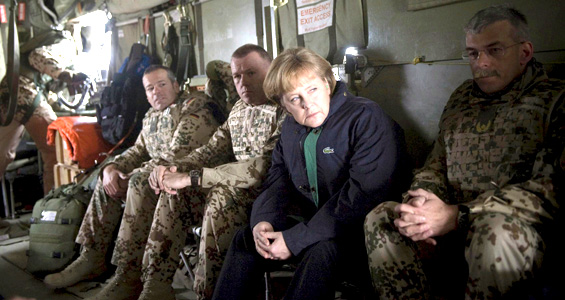German voters mull Afghan strategy
Post-World War Two Germany reassesses military role in Afghanistan ahead of election.

 |
| Post-Nazi era Germany has been forced to acknowledge its military role in Afghanistan [EPA] |
In a quiet backstreet behind Berlin’s hulking defence ministry stands a new memorial to fallen soldiers – the first of its kind in modern Germany, which is still too haunted by the Nazi era to feel comfortable building military monuments.
When this modest structure was unveiled earlier this month, there was an awkward moment.
In front of Franz Josef Jung, the defence minister, who has steadfastly refused to call Germany’s military mission in Afghanistan a “war”, Klaus-Dieter Diebel, the father of a young soldier killed there, made his own view plain.
“We ordinary people and … we families of dead Bundeswehr soldiers, can stand much more truth and candour than politicians give us credit for,” Diebel told the crowd.
“We families can’t come to terms with such deadly aggression with words that don’t sound real. We can only bear it, you see, if we call the real situation by its name.”
The remarks were aimed not just at Jung but across Germany’s political spectrum, where most politicians were hoping to get past this Sunday’s general election without mentioning the unpopular war.
‘End of innocence’
But fate would have it otherwise. As Diebel spoke, Nato confirmed that civilians had been killed in an air raid ordered by a German commander on two Taliban-hijacked petrol tankers.
It was the most deadly military incident Germany has been involved in since World War Two and was, wrote the influential Der Spiegel magazine, nothing less than Germany’s “end of innocence” in Afghanistan.
The deaths of an estimated 30 civilians because of a possible blunder by the German commander who ordered the air raid gave the country a dose of the truth and candour for which Diebel had been calling, and thrust Afghanistan into the middle of the election campaign.
| in depth | |||||||||||
|
It was quickly followed by growing concerns of massive voting fraud in the recent election there, and fresh video threats (three to date) against Germany by al-Qaeda, all of which combined to keep Afghanistan in the headlines throughout the election campaign and forced political leaders to respond.
The result has been a full-scale reassessment of Germany’s involvement, which will shape the decisions the next government makes about whether to stay or pull out.
“[The air raid] has changed the way the Germans view their role in Afghanistan – and not for the worse,” says Henning Riecke, an analyst with the German Council on Foreign Relations.
“There had been a slight manipulation of the truth by the political elite here. They presented it very much [as] a reconstruction mission, not a military one.”
The long shadow of Germany’s past means it is today perhaps Europe’s most pacifist country.
The deployment in Afghanistan is only the second time – after Kosovo – that German soldiers have fought on foreign soil since 1945.
Most polls show about six out of 10 German voters oppose the war.
Exit strategies
The country’s vocal anti-war activists see the debate following the tanker air raid as the beginning of the end of Germany’s presence in Afghanistan.
And indeed, most political leaders, including Angela Merkel, the German chancellor, and her main rival Frank-Walter Steinmeier, quickly began talking about exit strategies.
“The public debate has turned a corner,” says Reiner Braun, of the Co-operation for Peace.
“For the first time, German people recognise what our army is doing there in reality. Every war has symbols that change things. Vietnam had its symbols. This is one for Germany in Afghanistan.”
 |
| Most pundits believe Merkel will be re-elected chancellor in Sunday’s vote [GALLO/GETTY] |
But few commentators think it is that simple. Paul Schaefer, the defence spokesman for the socialist Left Party, which is the only party calling for a more-or-less immediate withdrawal, points out that the lift his party got in the polls after the air raid was only temporary.
In fact, opinion polls show support for Germany’s involvement in Afghanistan actually rose slightly after the air raids.
“More people are now discussing Afghanistan in the street and they are wondering what we are doing there,” he says.
“But I think what we’re seeing is more a polarisation than a swing against the war.
“People are rushing to defend their point of view, as if they realise that we are closer to some kind of decision-making point.”
What that decision will be of course depends on what Germany’s allies want and what the Afghan people do next.
The US will likely ask Germany to boost its present contribution of about 4,000 troops soon after the election, particularly in the wake of US commander Stanley McChrystal’s dire warnings of failure.
German troops boost?
Eckart von Klaeden, the foreign affairs spokesman for the parliamentary wing of Merkel’s conservative Christian Democratic Union, says the chancellor – who is all but certain to be re-elected on Sunday – would be reluctant but could not rule out an increase in German deployment.
“In the end we have to discuss what’s needed in Afghanistan to ensure our own security,” he says. “Failure is not an option.”
How a boost, rather than a withdrawal, is received on “Hauptstrasse Deutschland” may depend very much on whether voters get a bit more of Diebel’s “truth and candour”.
This means politicians would have to more honestly discuss the goals of the Afghan mission and the costs of achieving them.
Stabilising Afghanistan
According to von Klaeden, Germany’s expectations for Afghanistan are neither Utopian nor purely self-serving.
“A Western-style democracy in Afghanistan has never been the ultimate goal in the German debate,” he says.
“Of course we’re there to fight terrorism and secure our own safety. But it’s more than that. The goal is stability – not stability by warlords but stability with certain standards, such as human and particularly women’s rights.”
Analysts such as the Council on Foreign Relations’ Henning Riecke believe the lasting outcome of the debate sparked by the tanker air raid may be a Germany that is more comfortable facing up to the fact that it is, once again, a military player beyond its borders.
“What’s been missing in the past is a clear political commitment and a more sober picture of what Germany is doing there,” he says.
“It should be possible to talk about this … There is more leeway than the political elite are willing to accept.”
